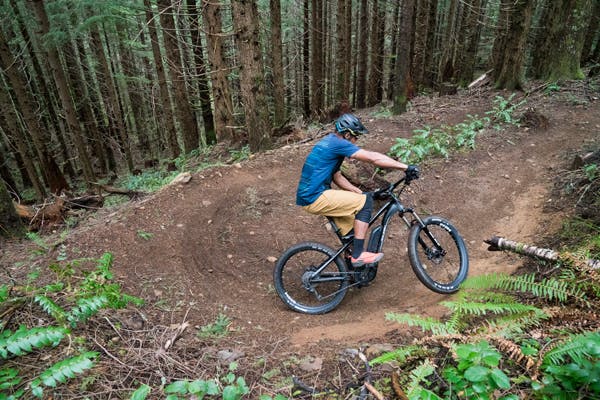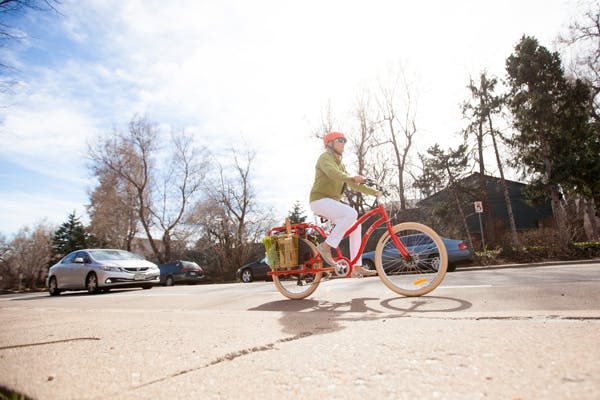Busting 10 Myths about E-Bikes
By: Morgan Lommele, Director of State & Local Policy

In some circles, electric bicycles have an undeserved bad reputation. Like just about anything new, they require an open mind and a positive attitude. As their popularity skyrockets around the world, it’s only a matter of time before e-bikes really take off in the U.S. Fact is stronger than fiction, so here are 10 e-bike myths and the truth behind them.
1. MYTH: They’re too fast!
FACT: Most e-bikes travel at bike-like speeds. Class 1 e-bikes have a motor that cuts off after the rider reaches 20 mph. This is the top assisted speed, not the average speed. On flat and uphill surfaces, class 1 e-bikes travel on average two to three miles per hour faster than traditional bicycles. Studies show that in some instances, e-bikes are slower than regular bikes, depending on the terrain and power produced by the rider.
2. MYTH: E-bikes riders are reckless, and they will harm me, my children and everyone I know!
FACT: E-bike riders, like nearly all riders, are generally respectful of the road. We are not aware of studies or reports that show that e-bike use decreases public safety.
3. MYTH: They are too heavy!
FACT: E-bikes are slightly heavier than traditional bikes, but the greatest contributor to a heavy mass in bicycling is personal weight, not the weight of an e-bike. It’s no different than riding a traditional bicycle with loaded panniers.
4. MYTH: E-bike access is a slippery slope and will lead the way to full motorized access on all non-motorized trails.
FACT: Pedal-assist e-bikes are fundamentally different from ATVs, off-road motorcycles and internal-combustion off-road vehicles. Motorized vehicle regulations were written before the invention of e-bikes and shouldn’t be used to regulate e-bike use. E-bikes are emissions- and noise-free. PeopleForBikes works to distinguish e-bikes from motorcycles and bicycles so that e-bikes are understood and non-motorized trail access is preserved.
5. MYTH: Bike paths will become a zoo!
FACT: Most e-bike users are like most other path users—they generally respect the law of the road and are kind to others with whom they share public resources. Riding an e-bike is like riding a regular bike. If you want to break the law, you don’t need an e-bike to do it.

6. MYTH: We need more public process before we decide whether to allow e-bikes!
FACT: Many studies have already been performed that evaluated how e-bike and bike riders interact on trails. One study demonstrated that trying out an e-bike increased a person’s acceptance and reduced their uncertainty around e-bikes. In Colorado, the City of Boulder studied e-bike use on shared paths and found minimal “conflicts” between trail users, no observed crashes, no negative verbal interactions, and safe passing.
7. MYTH: E-bike riders will go further into remote areas and won’t be able to pedal out if their batteries die.
FACT: There’s risk in everything we do. This is a lesson that you learn the hard way. Climbers, hikers and cyclists are rescued from difficult situations every day. Self-reliance and proper preparation must be emphasized.
8. MYTH: Speeding e-bikers can’t be slowed or ticketed.
FACT: Excessive speed—both on regular- and e-bikes—can be monitored and ticketed using radar guns. But this is a highly inefficient use of trail manager time. Furthermore, speeding on e-bikes has yet to be identified as a significant problem. Clear signage and public etiquette education are the best ways to encourage all trail users to travel at safe speeds.
9. MYTH: E-bike riders don’t know trail etiquette!
FACT: Sure they do. Most have years of trail experience. The typical e-bike rider is 45–65 years old and generally uninterested in reaching maximum speeds or passing other trail users without proper warning or slowing down.
10. MYTH: E-bikes are cheating!
FACT: We like to think that e-bikes aren’t cheating, they’re empowering.
We need to embrace e-bikes because they get more people on bikes more often. From older riders, to those with longer commutes, to people dealing with health issues, e-bikes provide important bike riding opportunities. We’re not saying they’re for everyone, but we believe that more people riding is not only good for everyone who rides, but for the entire community.
Let’s embrace the future and make the most of the many benefits that e-bikes offer.
